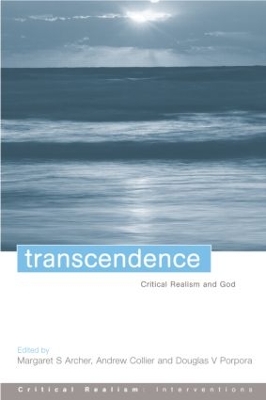Critical Realism: Interventions Routledge Critical Realism
2 total works
Conclusions follow both for environmental ethics - that natural beings should be valued for themselves, not just for their use to us - and for justice in the human world, based on the idea that humans are unique and equal in respect of 'having a life to live'.
Transcendence
by Margaret Scotford Archer, Andrew Collier, and Douglas V. Porpora
Atheism as a belief does not have to present intellectual credentials within academia. Yet to hold beliefs means giving reasons for doing so, ones which may be found wanting. Instead, atheism is the automatic default setting within the academic world.
Conversely, religious belief confronts a double standard. Religious believers are not permitted to make truth claims but are instead forced to present their beliefs as part of one language game amongst many. Religious truth claims are expected to satisfy empiricist criteria of evidence but when they fail, as they must, religious belief becomes subject to the hermeneutics of suspicion.
This book explores religious experience as a justifiable reason for religious belief. It uniquely demonstrates that the three pillars of critical realism - ontological intransitivity, epistemic relativity and judgemental rationality - can be applied to religion as to any other beliefs or theories.
The three authors are critical realists by philosophical position. They seek to establish a level playing field between religion and secular ideas, which has not existed in the academic world for some generations, in order for reasoned debate to be conducted.

